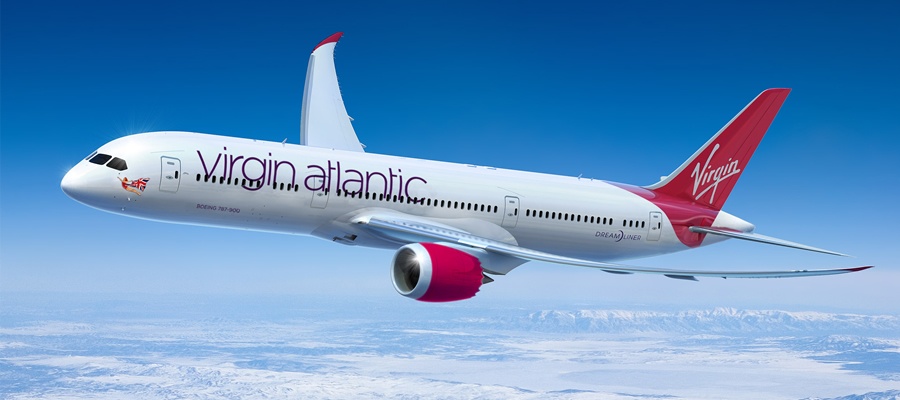As widely reported was to be the case, Virgin Atlantic has secured a refinancing package worth c.£1.2bn, which will be realised over the next 18 months. The recapitalisation package comes with a five-year restructuring plan, which has the full support of shareholders and investors, and aims to get the airline back to profitability by 2022.
The refinancing package comprises £600 million from shareholders – which includes the £200 million from the Virgin Group – the deferral of c.£400million of shareholder deferrals and waivers, cost savings of c.£280 million per year and c.£880million rephasing and financing of aircraft deliveries over the next five years. New partner Davidson Kempner Capital Management, a global institutional investment management firm, is providing £170million of secured financing. Creditors will support the airline with over £450million of deferrals.
The plan still needs to be approved by all creditors before implementation, but Virgin Atlantic states that with the full support of its major shareholders this is expected to be received quickly, with financing and restructuring plan to be in place for later this summer.
Virgin Atlantic described this deal as “a major milestone towards securing its future”, which will keep the airline flying.
The airline has already been reshaped and resized. In May, it reduced its workforce by 3,550 and closed its London Gatwick base, consolidating flying from Heathrow and Manchester.
By 2022, Virgin Atlantic says that it will fly the same number of sectors as 2019 despite its smaller scale, thanks to “productivity and efficiency improvements”. The airline will operate a streamlined fleet of 37 twin engine aircraft following the retirement of seven 747s and four A332s by the first quarter of 2022, with rescheduled delivery of outstanding A350s and A339s.
From July 20, Virgin Atlantic will restart passenger flying. The airline states that although “demand will be slow to recover, Virgin Atlantic will ensure its customers always feel confident to fly by continuing to prioritise the health, safety and security of its people and customers throughout their journey”. The airline has also singled out its dedication to improving sustainability noting that its simplified fleet will be “10% more efficient than it was pre-crisis”.
Shai Weiss, CEO of Virgin Atlantic, commented that the solvent recapitalisation of the airline will ensure it can continue to provide vital connectivity and competition to consumers and businesses in Britain and beyond.
“Once our plan is approved, we will continue to focus on providing our customers with the service they have come to expect. Despite the incredible efforts of our teams, through cancelled flights and delayed refunds we have not lived up to the high standards we set ourselves, but we will do everything in our power to earn back their trust.
Virgin Atlantic’s shareholder and joint venture partner, Delta Airlines has also released an update today.
In its second quarter 2020 results, Delta reported a $3.9 billion adjusted pre-tax loss on a more than $11 billion decline in revenue over last year.
The airline is burned through $27 million per day – although that is a 70% reduction since late March. Delta ended June with $15.7bn in liquidity – raising $15bn on a blended average interest rate of 5.5%, which includes the unsecured loan portion received under the CARES Act payroll support program (PSP). Delta has confirmed that it has amended existing credit facilities to replace all fixed charge coverage ratio covenants with liquidity-based covenants.
Ed Bastian, Delta's chief executive officer, believes it will be more than two years before the airline sees a sustainable recovery. “In this difficult environment, the strengths that are core to Delta's business – our people, our brand, our network and our operational reliability – guide every decision we make, differentiating Delta with our customers and positioning us to succeed when demand returns."
Delta is working to reduce costs. Its fleet has reduced significantly. During the June quarter, the company made the decision to retire the entire MD-90, 777 and 737-700 fleets and portions of its 767-300ER and A320 fleets by late 2020.
The airline has also managed further cost savings by reduced work schedules and voluntary employee leaves of absence as well as parking aircraft. Delta plans to launch voluntary separation and early retirement programs to proactively manage headcount and rescale operations.
“By raising cash early and aggressively managing costs, we are prepared to navigate what will be a volatile revenue period while making decisions that position Delta well for the eventual recovery," said CFO Paul Jacobson.
During the June quarter, Delta also recorded a write-down of $1.1bn in its investment in LATAM Airlines and a $770 million write-down in its investment in AeroMexico following their financial losses and separate Chapter 11 bankruptcy filings. Delta also wrote down its investment in Virgin Atlantic during the quarter, resulting in a $200 million charge.

